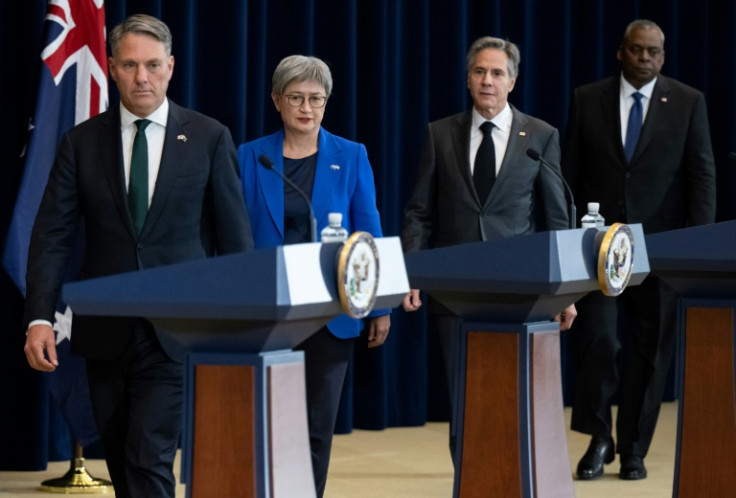US, Australia Invite Japan To Step Up Troop Rotations

The United States and Australia said Tuesday they would welcome Japanese troops into three-way rotations, vowing a united front in the face of China's rapid military advances.
Australia's defense and foreign ministers said they agreed to step up the pace of military interactions with the United States during talks with their counterparts in Washington, after which they will fly to Tokyo.
"It's really important that we are doing this from the point of view of providing balance within our region and involving other countries within our region and we look forward to being able to have more engagement with Japan," Australian Defense Minister Richard Marles told a four-way news conference.
"We can go to Japan at the end of this week with an invitation for Japan to be participating in more exercises with Australia and the United States," said Marles, in the first such talks since Australia's Labor government took office six months ago.
US Defense Secretary Lloyd Austin said the allies would seek Japanese participation in joint operations in Australia, where the United States has been rotating Marines since 2011 through Darwin, the strategic northern city struck by imperial Japan in World War II.
Austin said that the United States and Australia agreed to increase rotations of bomber task forces, fighter jets and the US Army and Navy.
"We agreed to enhance trilateral defense cooperation and to invite Japan to integrate into our force posture initiatives in Australia," Austin said.
Japan, a treaty-bound ally of the United States, has in recent years sought growing diplomatic cooperation with Australia, but defense ties have been more sensitive due to Tokyo's official pacificism since defeat in World War II.
But Japan in May took part in major three-way exercises on Australia's northeast coast that included infantry live fire and tank integration.
The three countries have increasingly seen common cause due to the growing assertiveness of China under President Xi Jinping.
"China's dangerous and coercive actions throughout the Indo-Pacific, including around Taiwan, toward the Pacific Island countries, and in the East and South China Seas, threaten regional peace and stability," Austin said.
The United States, Japan and Australia have worked together in recent years through the so-called Quad with India, which has been more hesitant than the other three about appearing to form an alliance aimed at China.
© Copyright AFP 2024. All rights reserved.











